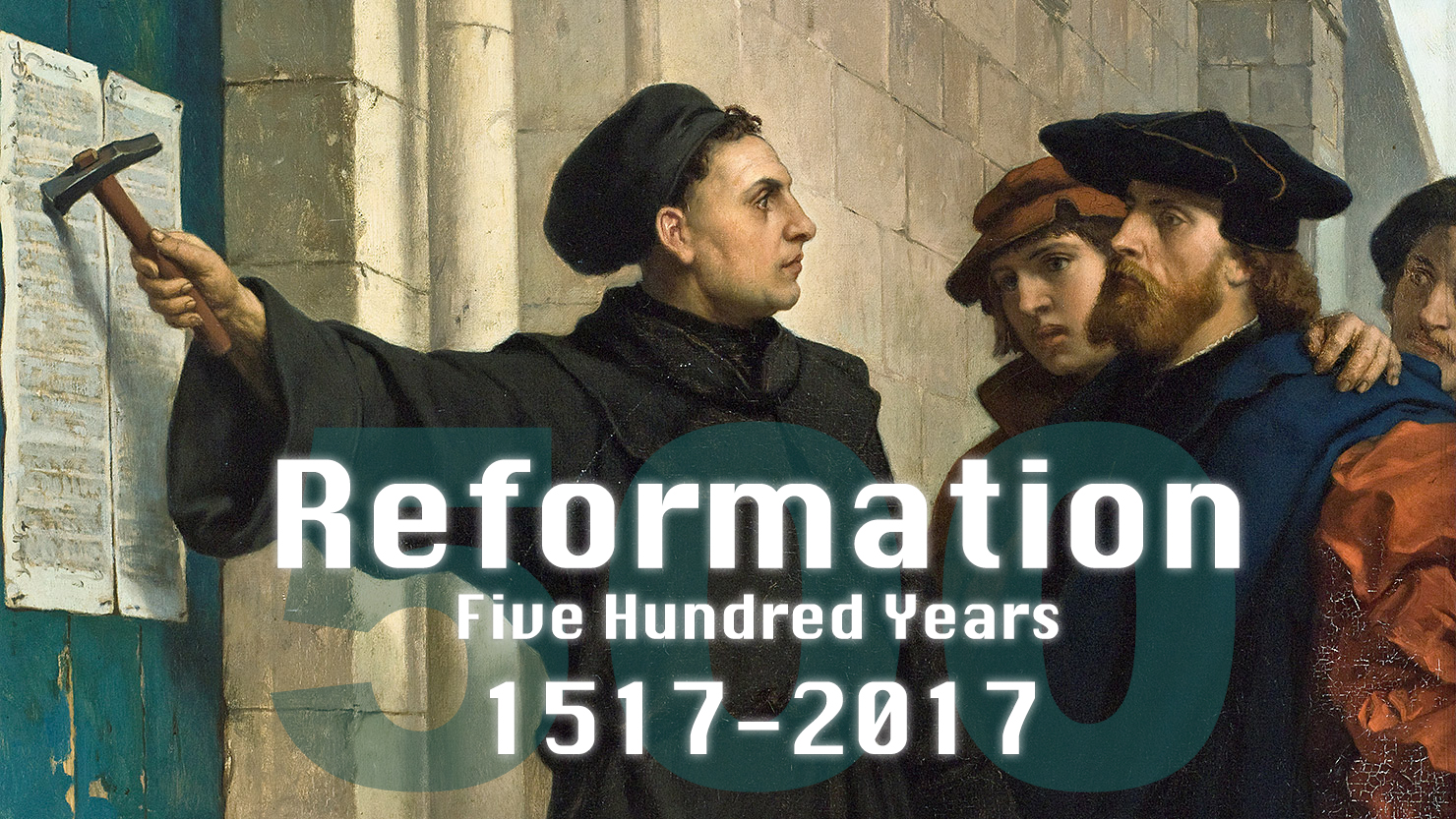The 500TH Anniversary of The Reformation
Historians usually date the start of the Protestant Reformation to Martin Luther’s publication of “95 Theses” posted on the door of the All Saints’ Church in Wittenberg Germany on October 31, 1517. Its ending can be placed anywhere from the 1555 Peace of Augsburg, which allowed for the coexistence of Catholicism and Lutheranism in Germany, to the 1648 Treaty of Westphalia, which ended the Thirty Years’ War. The key ideas of the Reformation—a call to purify the church and a belief that the Bible, not tradition, should be the sole source of spiritual authority—were not themselves novel. However, Luther and the other reformers became the first to skillfully use the power of the printing press to give their ideas a wide audience.
Did You Know?
No reformer was more adept than Martin Luther at using the power of the press to spread his ideas. Between 1518 and 1525, Luther published more works than the next 17 most prolific reformers combined.
Martin Luther (1483-1546) was an Augustinian monk and university lecturer in Wittenberg when he composed his “95 Theses,” which protested the pope’s sale of reprieves from penance, or indulgences. Although he had hoped to spur renewal from within the church, in 1521 he was summoned before the Diet of Worms and excommunicated. Sheltered by Friedrich, elector of Saxony, Luther translated the Bible into German and continued his output of vernacular pamphlets.
THE REFORMATION: SWITZERLAND AND CALVINISM
The Swiss Reformation began in 1519 with the sermons of Ulrich Zwingli, whose teachings largely paralleled Luther’s. In 1541 John Calvin, a French Protestant who had spent the previous decade in exile writing his “Institutes of the Christian Religion,” was invited to settle in Geneva.
Calvin’s Geneva became a center for Protestant exiles, and his doctrines quickly spread to Scotland, France, Transylvania and the Low Countries, where Dutch Calvinism became a religious and economic force for the next 400 years.
THE REFORMATION: ENGLAND AND THE “MIDDLE WAY”
In England, the Reformation began with Henry VIII’s quest for a male heir. When Pope Clement VII refused to annul Henry’s marriage to Catherine of Aragon so he could remarry, the English king declared in 1534 that he alone should be the final authority in matters relating to the English church. Henry dissolved England’s monasteries to confiscate their wealth and worked to place the Bible in the hands of the people. Beginning in 1536, every parish was required to have a copy.
THE REFORMATION’S LEGACY
Along with the religious consequences of the Reformation came deep and lasting political changes. Northern Europe’s new religious and political freedoms came at a great cost, with decades of rebellions, wars and bloody persecutions. The Thirty Years’ War alone may have cost Germany 40 percent of its population.
But the Reformation’s positive repercussions can be seen in the intellectual and cultural flourishing it inspired on all sides of the schism—in the strengthened universities of Europe, church music of J.S. Bach, the baroque altarpieces of Pieter Paul Rubens and even the capitalism of Dutch Calvinist merchants.
THE MAIN TENANTS OF THE REFORMATION – THE FIVE “SOLAS”
The “SOLAS” of the Protestant Reformation are a set of doctrines held by theologians and churchmen to be central to that period of change in the western Christian church. Each sola— from the Latin meaning “alone” or “only”—represents a key belief held by the reformers of the 16th century in contrast to the teaching of the Roman Catholic Church. The precise number of SOLAS varies, but lists of three and five are common.
The SOLAS were not systematically brought together until the 20th century. But sola gratia and sola fide were used by the reformers themselves. For example, in 1554 Philip Melanchthon wrote, “sola gratia justificamus et sola fide justificamur” (“only by grace do you justify, and only by faith are we justified”). All the SOLAS show up in various writings by the Protestant reformers, but they do not all appear in one place. In the earliest references to the SOLAS, three were typically mentioned: Scripture over tradition, faith over works, and grace over merit. Each of these pairs of terms is intended to highlight how Protestant teaching differs from Roman Catholic teaching.
SOLA SCRIPTURA (“by Scripture alone”)
The phrase, sola scriptura, or “by scripture alone,” asserts that the Bible must determine church traditions and interpretations. All church practices and doctrines must be in unity with the teachings of Scripture, the divinely inspired Word of God. This principle asserts that the Bible is to be interpreted through itself, with one passage of Scripture being useful in the interpretation of other passages. It shows that the Bible is a unified system of truth as well as the revelation of truth. The teachings and customs of the church must align themselves with the Word of God; only then can they be applied with any assurance of God’s approval and of their own trustworthiness.
SOLA FIDE (“by faith alone”)
The two Latin words, sola fide, translated “by faith alone,” declare that good works are not the means by which salvation is attained; neither are they required nor accepted by God for granting salvation. Sola fide is the teaching that justification (understood in Protestant theology as “being declared just by God”) is received by faith alone, without the need for good works on the part of the believing individual. Good works may be viewed as the evidence of saving faith; they do not determine salvation.
Martin Luther used the expression “simuljustusetpeccator” (“at the same time justified and a sinner”). Justification is entirely the gracious work of God. It is only as a justified person that one is enabled to do anything that is acceptable (good or righteous) in the sight of God.
SOLA GRATIA (“by grace alone”)
The idea that a person’s merit is excluded from having any part in salvation is expressed in the words, “by grace alone” (sola gratia). Salvation comes by divine grace, God’s “unmerited favor,” and not as something offered, exchanged, or sacrificed by the sinner. Salvation is a gift, an unearned blessing from God for Christ’s sake.
SOLUS CHRISTUS or SOLO CHRISTO (“Christ alone” or “through Christ alone”)
The expression, solus Christus, means “only Christ,” and indicates that Christ is the exclusive mediator between God and man. In other words, there is salvation through no other person, because no other person’s intervention or intercession, whether pastor, rector, bishop, or Pope. The phrase is sometimes rendered, solo Christo, since salvation is “by Christ alone.” This SOLA of the Reformation rejects “sacerdotalism,” a term meaning that there are no valid sacraments in the church without the services of a properly ordained clergy.
Most Protestant denominations understand the Bible to teach that there are only two continuing ordinances in the Christian church, baptism and the Lord’s Supper. Solus Christus does not deny the office of ministry in the church, to which is committed the public proclamation of the gospel and the administration of the sacraments. On the contrary, it affirms that Christ is the only priest (the High Priest) of his church, and that no saving grace at all is communicated to human beings except through him. His ministers (his pastors and teachers along with any true Christian) are commissioned by him to bring the light and life of salvation to the attention of saints and sinners, but they are not the “administrators” of salvation in any other sense than being messengers and “managers” of Biblical truth.
SOLI DEO GLORIA (“glory to God alone”)
Soli Deo gloria teaches that all glory is due to God alone, since salvation is accomplished solely through his will and his action. The reformers believed that human beings are not worthy of that glory.
The Protestant reformers were convinced that certain teachings of the Bible were necessary for a true understanding of the way of salvation. The Christian faith stood in jeopardy of being overthrown unless these doctrines were taught with precision, power, and persuasion. They continue to be upheld in true Bible believing and teaching churches today and in many evangelical churches as well. SOLA SCRIPTURA, the Bible alone is our final authority in every area of life because it is the Word of God. SOLUS CHRISTUS, Christ alone, in his perfect life and atoning death in the sinner’s place, is the basis for our acceptance by God. SOLA GRATIA, the grace of God alone in Christ and not works of human merit or effort is why God saves sinners. SOLA FIDE, faith alone is the means by which sinners receive or appropriate this grace of God. SOLI DEO GLORIA, to God alone belongs the glory for saving sinners and for everything else in this life and the life to come.
IS THE REFORMATION OVER?
But is the Reformation on its last gasp? Not where the Gospel is prized and preached. Not where a denial of justification by faith alone is known to be a denial of the Gospel itself — and to be a heresy that has lasted far more than 500 years. Today and until Jesus Christ comes again, true believers in Christ must defend and proclaim until death the message of the Gospel of grace built on Scripture alone that teaches eternal salvation is by grace alone, through faith alone, in Christ alone, for the glory of God alone!






Leave a Reply
You must be logged in to post a comment.